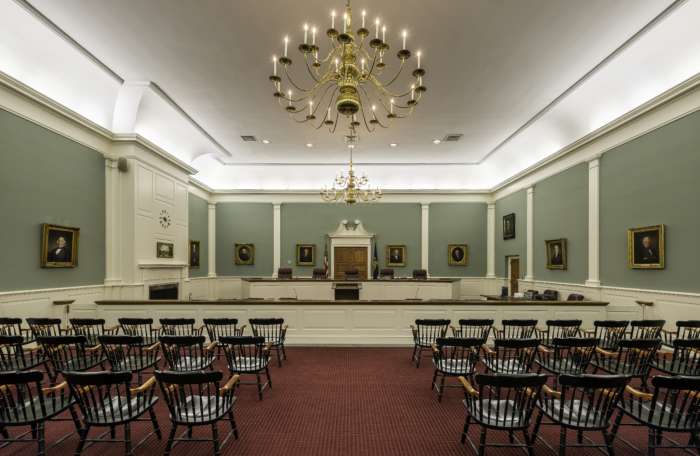The scalping of Gordon MacDonald and the demise of an honorable culture
“But, it is impossible for us to be blind to the facts which are daily transpiring before us. It is impossible for us not to perceive that party spirit and future elevation mix more or less in all our affairs, in all our deliberations.
— Henry Clay, Feb. 5, 1850
The Executive Council’s 3-2 party-line rejection of Attorney General Gordon MacDonald’s nomination to become chief justice of the state Supreme Court marked a cultural turning point for New Hampshire.
In 2017, MacDonald sailed through his Attorney General confirmation. “He’s someone I’ve met through (legal) practice, WMUR-TV reported a member of the Executive Council as saying. “I’ve generally thought him to be a sophisticated, thoughtful lawyer, which is what I want in an attorney general. He’s never been known to have any ethical issues.”
This week, a councilor condemned MacDonald as having been associated with politicians who have “shockingly extreme views.”
Both comments were uttered by the same councilor, Concord Democrat Andru Volinsky.
Thus Volinsky, a convention delegate for Bernie Sanders, a self-described socialist who would abolish all private health insurance, labeled as a radical extremist a convention delegate for… Marco Rubio.
For context, the “ideology score” matrix run by the website govtrack.us puts Rubio slightly to the right of center among Republican senators. Bernie Sanders resides all alone on the extreme far left of not just the Democratic Party, but of the entire U.S. Senate. There the Sanders supporter stands, pointing back toward the middle and shouting, “extremist!”
In his hearing, MacDonald said repeatedly that as chief justice he must not be guided by his personal views, which he never disclosed and which no one had been able to define. He would be guided only by the rule of law, he said.
Volinsky dismissed that standard phrase as a “talisman” used by dishonest partisans to hide their true, radical agendas.
“But the talisman no longer works because we live in the age of Donald Trump and Mitch McConnell, of Neil Gorsuch and Brett Kavanaugh, and of the legislatures in Alabama, Georgia, Missouri and Utah — all of which are committed to overturning the rule of law,” Volinsky wrote in a column explaining his vote.
With that, MacDonald was marked as dishonest, unethical, and a threat to the rule of law itself by the very government official who had previously called him a “sophisticated, thoughtful lawyer.”
Incidentally, last week, Volinsky announced he had formed an exploratory committee to run for governor.
As for shocking extremism, an analysis by FiveThirtyEight found that U.S. Supreme Court Justice Kavanaugh has voted with fellow Trump appointee Gorsuch 70.3 percent of the time. He’s voted with Barack Obama appointee Elena Kagan… 70.3 percent of the time. What a strange record for someone “committed to overturning the rule of law.”
“I’ve known Gordon for 22 years, and the idea that he’s ‘an extremist’ or ‘shocking’ is mind-numbingly crazy,” Scott O’Connell, a Democrat and attorney at Nixon-Peabody, told NHJournal after the vote. “It’s unfounded, and it’s bulls**t.
“Gordon has a 30-year track record of outstanding service and now they think he’s been, what, a closet right-winger the entire time? It’s ridiculous. He’s set a record of exemplary behavior, so they have to go back 30 years to find an excuse to vote against him,” O’Connell said. “It’s just guilt by association.”
The associations with alleged shocking extremists were made again and again. MacDonald once worked for U.S. Sen. Gordon Humphrey decades ago. He was a Rubio delegate in 2016. He formerly served on the board of the Josiah Bartlett Center for Public Policy. Horrifying.
Gordon Humphrey, always a party outsider, left the GOP after Trump’s election and endorsed Democrat Chris Pappas for Congress last year. The Bartlett Center board has included such noted shocking extremists as moderate Republican attorney Brad Cook and income tax-supporting former Gov. Walter Peterson. Peterson chaired the Bartlett Center’s board.
Not a single personal or political view of MacDonald’s was discerned by the discussion of these associations. But discovering his views was never the point.
In legal circles, it’s understood that political and legal views are not synonymous. That truth has guided past judicial nominations. No longer.
This is why so many lawyers of both parties have expressed anger at the vote. New Hampshire’s state courts have been a refuge in the weed-like spread of politics into all areas of life. Once the courts become conquered territory, the merits of judicial nominees will be determined by party label rather than legal ability. That is a threat not just to the impartiality of the courts, but to the credibility of the entire legal system.
As former chief justice and head of UNH Law John Broderick said, “These appointments have never been viewed through a political prism and once we start doing that – assume that because once you were an active Democrat or once you were an active Republican and so you will automatically rule a certain way – we are going down an avenue we ought to not head down.”
Broderick was New Hampshire co-chair of Bill Clinton’s New Hampshire campaign before his elevation to the Supreme Court.
Before the vote, dozens of lawyers of both parties emerged to push back against this. Democratic attorney and Beto O’Rourke supporter Jay Surdukowski helped lead the charge against politicizing the confirmation vote. Lending their support were 100 lawyers, including past Supreme Court justices, Democratic Gov. John Lynch’s legal counsel, and the director of the Rudman Center for Justice at UNH Law School. Others, including Broderick, traveled to testify in person on MacDonald’s behalf.
None of it mattered. The bipartisan effort to keep politics out of MacDonald’s confirmation was the last futile gesture of a crumbling culture, once held dear, in which honor and equity were cherished above party and power.
That culture has been conquered. Every inch of public ground has been converted to a political battlefield. No neutral territory remains.


